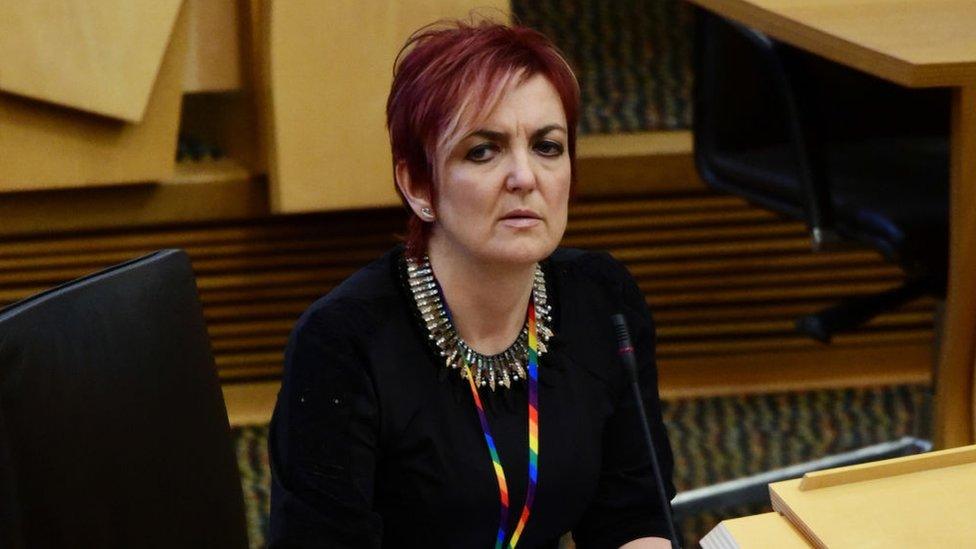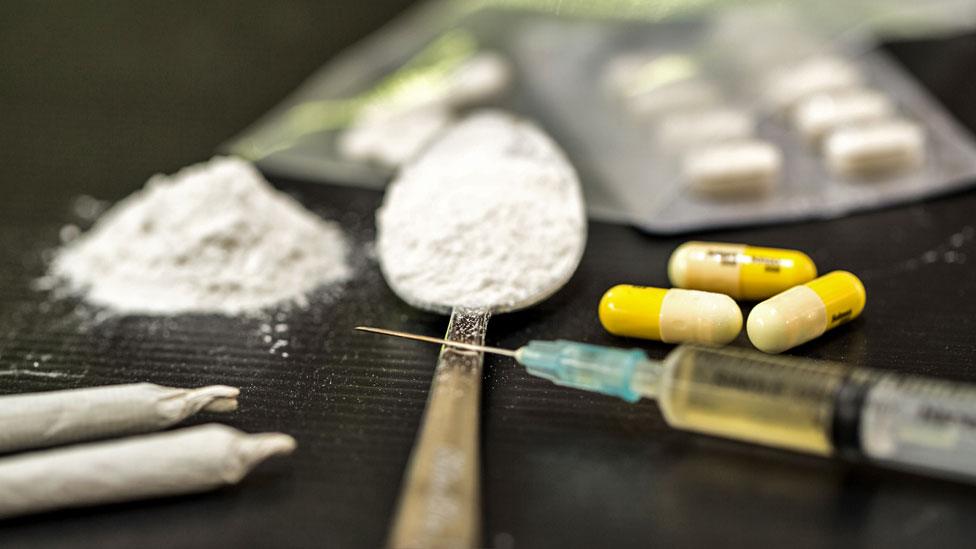Drug deaths: Right to Recovery Bill lodged at Holyrood
- Published

Douglas Ross is to lodge draft legislation in Holyrood to tackle drug deaths
Scottish Conservative leader Douglas Ross has lodged draft legislation at Holyrood to tackle drug deaths.
Scotland has the highest drug death rate in Europe, with deaths reaching a record high in 2020.
Mr Ross has urged MSPs to rally behind the Right To Recovery Bill, which would enshrine in law the right to receive "potentially life-saving" treatment, including residential rehabilitation.
The Scottish government said it would consider backing the bill.
Mr Ross called Scotland's record on drug deaths a "national tragedy".
He said it "ought to shame the SNP government who have presided over the huge rise in numbers", and claimed the Conservative bill could be a "game-changer" if it became law.
Mr Ross added: "Today it moves another step closer to the statute book, when I formally submit the final proposal to parliament."
His party has previously accused the Scottish government of cutting rehabilitation programmes, which the Tories claimed had played a role in the number of deaths.
He urged MSPs from across parliament to back the bill.
It comes after Labour announced a consultation on a proposed Drug Death Prevention Bill last week.
It would see the Scottish Parliament vote on introducing overdose prevention centres (OPCs) - also known as consumption or "fix" rooms.
Scottish Liberal Democrat leader Alex Cole-Hamilton said while creating legal rights was straightforward, often they were not matched by the focus and funding needed to make them reality. He said a long-term commitment was required to stop the Tory proposals becoming "a fig leaf to cover the failure of SNP and Conservative parliamentarians to grasp the thistle of drug policy reform".
'Small window' for treatment
Tory MSP Dr Sandesh Gulhane told BBC Radio's Good Morning Scotland programme there was a small window of opportunity when drug users went to their GP in which to get them help.
Dr Gulhane, who also works as a GP, added: "The problem is the length of time it takes for people to get help.
"When somebody comes to see me... I can't give them the instant help they need… I have to put them into referral process, by the time they get to be seen, they are back drinking [or using drugs] and don't want help anymore."

The Scottish government's drugs policy minister Angela Constance says the Scottish government is working to "turn the tide on drug deaths"
The Scottish government's drugs policy minister Angela Constance insisted that the Scottish government was working to "turn the tide on drug deaths" and had invested £250m.
She added that she had an open mind about whether legislation was needed.
She told Good Morning Scotland she would take a view on whether the Scottish government would back the bill once it had been published, adding: "I have an open mind about whether, at some point, we need to legislate."
Ms Constance added: "This is about how we make people's rights real in practice on the ground, and we are doing that by investing and reforming services."
The minister added that the Scottish government was gathering more evidence about what was currently working. She said this covered the whole system of care, including residential facilities.


All politicians agree that Scotland's rate of drug-related deaths is a serious problem which requires cross-party working and innovative solutions.
But for all the appetite to take the politics out of the issue, there is a limited amount of time and money to work with at Holyrood. MSPs need to decide which of the many proposed measures should take priority.
The Conservative plan might not seem like a heavy commitment in the immediacy, given the government already has a duty to provide healthcare and treats alcohol and drug dependency as a healthcare issue.
But the key to Douglas Ross's legislation is the delivery. In order to ramp up the number of people entering rehab, without increasing waiting times, many more centres and beds will be required.
The government is absolutely in favour of rehabilitation, and is putting £100m towards it this parliamentary term - but that doesn't necessarily mean this bill is a slam-dunk.
Ministers will want to assess how it would sit alongside all of the other elements of their "national mission" to reduce drug deaths before they support it in parliament.

On Monday the Scottish government published a review which said residential rehabilitation could reduce substance misuse and improve health and quality of life. It also highlighted the importance of ongoing support following a placement.
David McCartney, chairman of the Scottish government's working group on residential rehabilitation, said it should be ensured that "residential rehabilitation was an accessible part of a comprehensive and joined-up recovery-oriented system of care".
Residential rehabilitation has been allocated more than £100m by the government over the course of this parliament.
Prof Catriona Matheson, former chairwoman of the Scottish Drugs Deaths Task Force, told Radio Scotland the bill was "well intentioned", but she did not think it would have a major impact on reducing drug-related deaths - adding that it was "probably unenforceable".
She added: "The emphasis in the bill about access to treatment focuses on residential rehabilitation... and not nearly enough on the harm reduction measures and the access to good quality medication, assisted treatment, that we know from evidence over many, many years - that is what will bring down our drug related death figures."
- Published15 March 2022

- Published30 July 2021
